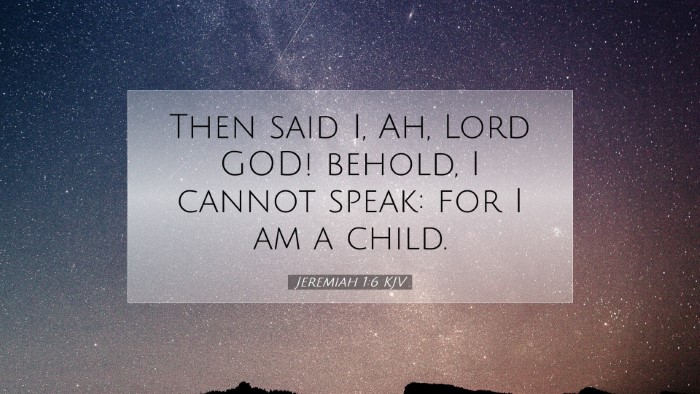Commentary on Jeremiah 1:6
Jeremiah 1:6 states:
"Then said I, Ah, Lord God! behold, I cannot speak: for I am a child."
Introduction
This verse captures the moment of divine calling when Jeremiah expresses apprehension about his suitability for the prophetic mission. It serves as a significant turning point in the narrative of Jeremiah’s commission, wherein his self-doubt contrasts starkly with God’s sovereign choice.
Insights from Commentators
Matthew Henry
Matthew Henry emphasizes the sincerity of Jeremiah's reaction. He notes that the prophet's hesitation illustrates a common response among God's chosen instruments when confronted with His call. Henry remarks that Jeremiah's self-identification as a "child" suggests a recognition of his youth and inexperience in public speaking, which aligns with the biblical theme of divine empowerment in lieu of human inadequacies.
Albert Barnes
Albert Barnes details how Jeremiah’s humble admission of inability reflects a true servant's spirit. He posits that Jeremiah's feeling of inadequacy does not stem from a lack of faith but rather a deep awareness of his human shortcomings. Barnes also suggests that God often calls those who feel least qualified, intending to demonstrate His power through their weaknesses.
Adam Clarke
Adam Clarke expands on the implications of Jeremiah’s protest. He describes the societal context in which Jeremiah lived, highlighting the common expectations placed upon a prophet. Clarke notes that the designation “child” in this passage not only refers to age but also an association with a lack of authority or credibility in the eyes of the people. This raises important questions about the nature of prophetic authority in ancient Israel.
Theological Reflections
The reaction of Jeremiah invites a theological exploration of God’s method of equipping those He calls. The divine calling often comes not when individuals feel most prepared, but rather when they sense their inadequacies. This theme underlines God’s preference for using the meek and humble, as He showed with Jeremiah, Moses, and many others throughout the Scriptures.
God's Sovereign Choice
Throughout the Bible, God’s choice of individuals often defied human logic. Jeremiah’s initial apprehension reminds the reader that God’s plans are based on His purposes rather than human capabilities. Thus, recalling 1 Corinthians 1:26-29, we see that God uses the foolish things of the world to confound the wise.
The Use of Personal Inability
This passage serves as a profound reminder that personal feelings of inadequacy can lead to reliance on God. As the Apostle Paul stated in 2 Corinthians 12:9, “My grace is sufficient for you, for my power is made perfect in weakness.” This truth is mirrored in Jeremiah’s context, where the strength of the message heralded through the prophet arises not from his eloquence but from God’s empowering presence.
Encouragement for Modern Believers
For pastors, theologians, and students alike, Jeremiah 1:6 offers encouragement amidst feelings of inadequacy. In ministry or theological pursuits, one may often feel insufficient for the tasks at hand. Yet, God’s calling is not contingent on our perceived strengths but on His eternal purpose and readiness to empower those who submit to His will.
Conclusion
Jeremiah's cry of helplessness is not a disqualification but rather an invitation into deeper communion with the divine. As believers reflect on this verse, they are challenged to approach their calling with humility while trusting that, like Jeremiah, they can fulfill their purpose not by their might but by God’s Spirit.


